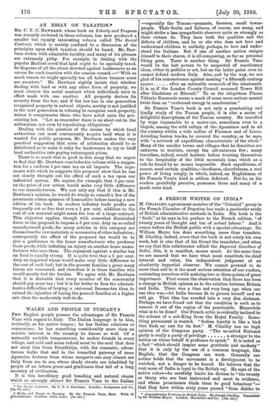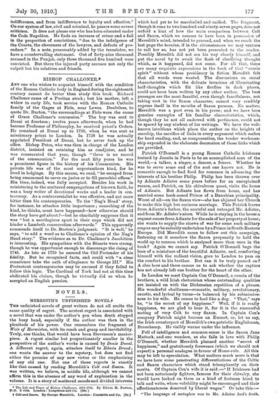A FRENCH WRITER ON INDIA.*
M. °HAMLET, a prominent member of the "Colonial" group in the French Chamber of Deputies, has made a particular study of British administrative methods in India. His book is the "fruit," as he says in his preface to the French edition, "of twenty years of thought and ten of actual labour." And it comes before the British public with a special advantage. Sir William Meyer has done something more than translate. M. Chailley, indeed, avers that the book is not solely his own work, but is also that of his friend the translator, and when we say that this collaborator edited the Imperial Gazetteer of India, this, it is manifest, means much. At the same time we are assured that we have what must constitute its chief interest and value, the independent judgment of an absolutely impartial observer. We cannot pretend to do more than call to it the most serious attention of our readers, contenting ourselves with noticing two or three points of great importance. First comes the observation that there has been a change in British opinion as to the relation between Britain and India. There was a time not very long ago when our one idea was,—let India become fit to govern herself and we will go. That idea has receded into a very dim distance. Perhaps we have found out that the condition is such as to remove it out of the region of the practicable. Meanwhile what is to be done P Our French critic is evidently inclined to the scheme of a sub-King from the Royal Family. Some- thing permanent is wanted. " Indian loyalty is like a bird that finds no rest for its feet." M. Chailley has no high opinion of the Congress party. "The so-called National
party is really a party of privilege a stranger to the nation on whose behalf it professes to speak." It is noted as a fact "which should inspire some gratitude and modesty" that it is only by the use of a common language, like English, that the Congress can work. Generally our author holds that the movement is a development to be watched, not a danger to be feared. He believes that the vast mass of India is loyal to the British raj. He says of the native rulers—he carefully limits his dictum to "the twenty or thirty who are best instructed and most in evidence, and whose prominence binds them to good behaviour"— that they have within sixty years passed "from dislike to
• Administrative Problems in British India. By Joseph Chunky. Translated by Sir William Meyer. London: Macmillan and Co. [108. net.] indifference, and from indifference to loyalty and affection." On•our system of law, civil and criminal, he passes some severe criticism. It does not pleaae one who has been educated under the Code Napoleon. He finds an increase of crime and a fall in the proportion of convictions, "due to the indulgence of the Courts, the cleverness of the lawyers, and defects of pro- cedure." In a note, presumably added by the translator, we have a countervailing statement. Out of forty-nine thousand accused in the Punjab, only three thousand five hundred were convicted. But there the injured party accuses not only the culprit but his relatives and friends.







































 Previous page
Previous page